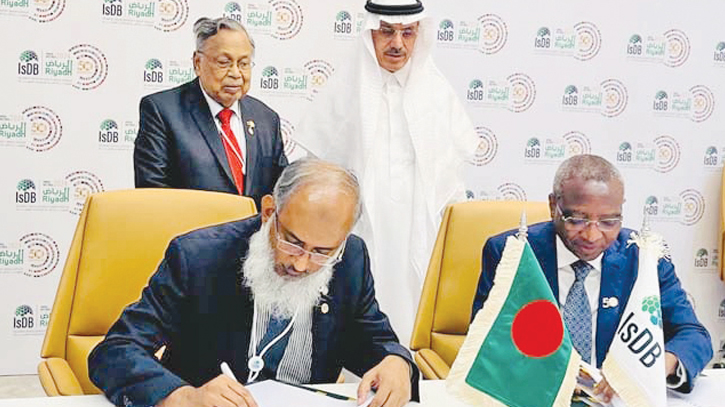
Photo: Courtesy
The government of Bangladesh and the Islamic Development Bank (IsDB) have signed a loan agreement amounting to 270.57 million ($289.52 million) euros. The agreement titled “Rural and Peri-Urban Housing Finance Project-Second Phase” was signed at the IsDB annual meeting held in Riyadh, the capital of Saudi Arabia, on Monday. The duration of the project is five years from the date of effectiveness.
Md Shahriar Kader Siddiky, secretary of the Economic Relations Division under the Ministry of Finance, and Dr Mansur Muhtar, vice president of IsDB, signed the loan agreement on behalf of their respective sides, says a press release.
At the signing ceremony, Bangladesh’s Finance Minister Abul Hassan Mahmood Ali and IsDB Chairman Dr Muhammad Al Jasser were present.
The project will be implemented by the Bangladesh House Building Finance Corporation under the Financial Institutions Division.
The objectives of the project are to provide affordable housing loans for the construction of well-planned, sustainable, and eco-friendly multi-storied residential buildings with essential amenities for the low and lower-middle-income population living in rural and peri-urban areas of the country.
As a result, the conservation of cultivable land will be possible by ensuring the optimum and the best use of land through implementing the project.
Besides, it will strengthen the capacity of the House Building Finance Corporation in its house construction loan financing activities.
IsDB is one of the trusted multilateral development partners of Bangladesh and has been providing continuous support for the socio-economic development of the country since its inception in the form of grants, project loans, trade financing, private sector financing, export credit, guarantees, etc.
Since its membership in 1974, IsDB has created 2.2 million jobs in Bangladesh. In addition, its financing assisted the country in increasing the installed energy generation capacity by about 3,400MW of power, powering 258,000 homes. In the agriculture sector, crop production increased by 2.5 million tonnes.
Besides, in the education sector, approximately 100,000 students benefited from access to education and better facilities. In the telecommunication sector, about 1,500 kilometres of fibre optic network was built and about 160 million new subscriptions for land/mobile/internet connections were supported.
Messenger/Disha








